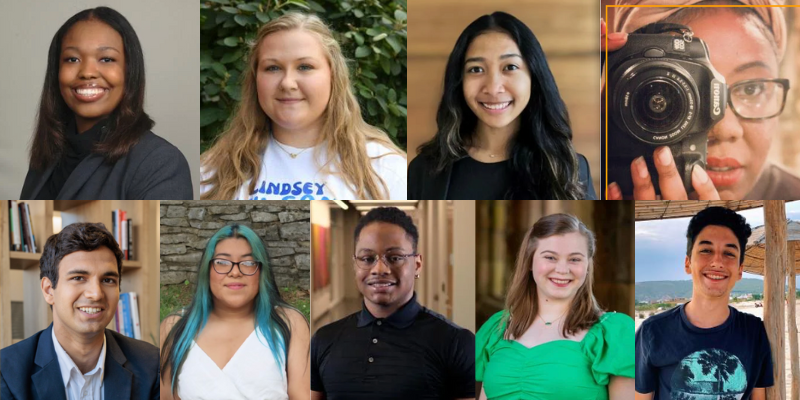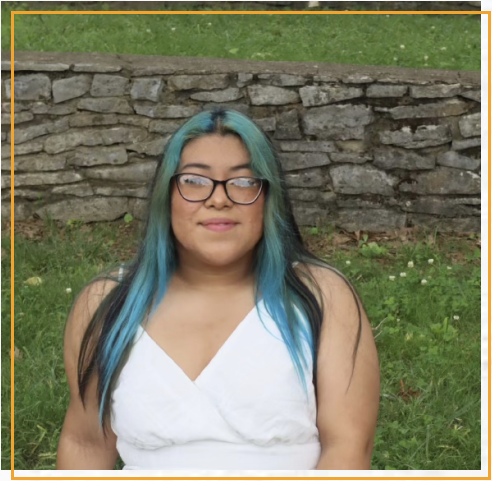We are excited for the nine Bonners who have been nominated to be a part of the 2024 -2025 Newman Civic Fellowship!
The Newman Civic Fellowship is a yearlong program that recognizes students who stand out for their leadership potential and commitment to creating positive change in communities. Fellows are nominated by Campus Compact member presidents and chancellors, who are invited to select one exemplary community-committed student from their campus each year.
Through the fellowship, Campus Compact provides these students with learning and networking opportunities that help to nurture their development as civic leaders. Programming emphasizes personal, professional, and civic growth that can empower them to collaborate effectively across disciplines and create large-scale positive change.
The cornerstone of the fellowship is the Annual Convening of Newman Civic Fellows, which offers intensive in-person skill-building and networking over three days. The fellowship also provides fellows with pathways to apply for exclusive opportunities, including mini-grants to help fund scholarships and post-graduate opportunities.
Below are the personal statement from each of the nine Bonners who are part of the 2024-25 cohort of Newman Civic Fellows.
Aaniyah Jarrette ‘24
SPELMAN COLLEGE
Biology on the pre-medical track
I grew up volunteering regularly with my family at food banks and homeless shelters in my hometown of Clayton County, Georgia. In high school, I began to see connections in the work that I was doing at different agencies that served some of the same people. I could see how insecurity in one area, like housing, would create challenges for the impacted family in other areas, such as education and employment. I became curious about how these challenges facing my community were interrelated. As a member of the Health Careers Program, I have researched housing insecurity as a social determinant of health, and as a result, I began to focus my work with the non-profit organization Hearts to Nourish Hope on ensuring that the health fairs we host offer resources to support housing security alongside health assessments and helpful medical information. While enrolled at Spelman College, I continued my engagement with Hearts to Nourish Hope, volunteering weekly. On campus, I'm active in organizations that focus on addressing the symptoms of poverty and social injustice and work intentionally to attack the root causes of these persistent issues.
Emma Mallory ‘24
LINDSEY WILSON COLLEGE
Human Services and Counseling
Emma Mallory is a Lindsey Wilson College student devoted to her studies and the betterment of her community no matter where she is. She is a Human Services and Counseling major focusing on creating equal opportunities and providing help to all. Through her work with the Bonner Scholar program, she has been able to increase her advocacy efforts because of her work at Light of Chance Inc. where she engaged with children impacted by substance misuse by sitting in on counseling sessions, participating in life skill classes, and joining mindfulness practices. By providing a safe and empowering place for youth to thrive, she hopes to end the prevalent cycle of drug misuse among adolescents that is so popular due to media, culture, and peer pressure. In her time there, she was also able to help them create and open Emerge Living, a free men's sober living house with an empowering intensive outpatient program. Her goal in her final year of schooling is to continue to promote opportunities for all as a result of her work at the Academic Success Center on campus and in the future, become a school counselor to show that everyone has someone who will listen.
Emma Lively ‘25
THE UNIVERSITY OF THE SOUTH
Religious Studies with a Certificate in Civic and Global Leadership
I was raised in Southern Appalachia by public school teachers who taught me to advocate for myself and others. In high school, I attended a summer program. I realized that students at other schools were getting guidance about college applications that I was not, some of it as simple as knowing about the Common Application. I began advocating for myself and my classmates, sharing everything I learned and becoming one another’s coach as we filled out applications. The Bonner program at Sewanee has allowed me to continue advocating for others by providing high school students with college and career counseling. When I work with the students, I provide them with support I did not have in high school. Whether it’s answering questions about applying for financial aid or preparing them for interviews, my work centers around helping them develop a sense of agency about their future. The students all have great potential, passion, and goals that, if not supported, might never be fulfilled or achieved. I believe in a world where students have equitable educational support and where their great potential is fully realized and fully celebrated.
J Ramirez ‘26
MARYVILLE COLLEGE
Design
Racial inequality and politics have been on the forefront of my mind since childhood. At 7, I experienced my first racially motivated encounter, when someone in a red pickup truck hurled racial slurs and a soda can at me while walking home with my mom. This prompted a crucial conversation about racism with her. Eight years later, I addressed politicians running for senator office, advocating to eliminate section 287(g), an agreement allowing police to act as immigration officers. Despite their initial agreement, the eventual officeholder broke the promise and supported 287(g), claiming it protected Tennesseans. Since then, I've been actively involved in numerous protests and initiatives aimed at combating racial inequality. My outspokenness has garnered recognition from my professors, leading to invitations to participate in forums addressing diversity, equity, and inclusion on my college campus. These discussions have delved into the experiences of people of color in predominantly white educational environments, as well as proposing minor changes our college can implement to challenge racial inadequacies.
Jay Philbrick ‘24
BROWN UNIVERSITY
Applied Mathematics-Economics, Computer Science
I am a student at Brown University, studying applied mathematics-economics and computer science. I grew up in rural Maine and witnessed how government investments changed the destinies of entire communities. Inspired by this, I have a deep interest in promoting greater economic opportunity for all, especially the most vulnerable, through evidence-based economic policy. I have previously held policy internships at the White House’s Council of Economic Advisers, the U.S. Department of State’s Office of Monetary Affairs, and Maine’s Governor’s Office of Policy Innovation and the Future. Informing this policy experience are economic research experiences, which I have completed at Yale University, the Federal Reserve Bank of Boston, the U.S. Securities and Exchange Commission, and at Brown University. Through my policy experiences, I have recommended executive action that has saved consumers nearly $4B and shaped the allocation of $1B in pandemic-era stimulus funding. Policy areas I am interested in include tax policy, social services, and antitrust policy. In the future, I plan to pursue a JD and a PhD in economics to contribute to the forefront of economic research and policymaking at the state and federal levels.
LaRodge Johnson-Miller ‘25
RUTGERS UNIVERSITY - CAMDEN
Photography and Marketing
My passion for community engagement started when I was hired as an artist apprentice on the New View Camden Project in the spring of 2020, which leveraged art to inform the community about the problem of illegal dumping in Camden, NJ. Camden is a “majority-minority” city, which has been disinvested for many decades and, sadly, has been viewed as a site for illegal trash dumping for many from the surrounding communities. Seeing art used as a driver to make social change in a place that I called my home inspired me to pursue art activism to help address civic issues and explore how art could bolster the local economy. That experience stuck with me as I moved into my college career at Rutgers–Camden, where I joined the Bonner Civic Scholars program in my first year as a transfer student. Since then, all of my experiences have emphasized how critical art can be not only aesthetically, but also as a means for recording history and building community engagement. I believe that art is an important tool for my own personal growth as an activist and for the development of my community of Camden.
Lee’RayVone G’everdloaahn ‘26
AUGSBURG UNIVERSITY
Psychology/Critical Race & Ethnicity Studies
Growing up in North Minneapolis, MN, I've witnessed and experienced various community issues like police brutality, inadequate mental health resources, gang violence, addiction, and much more. Despite hoping for improvement time and time again, conditions have persisted, birthed in the fabric of American society for centuries. If there is one thing that Critical Race has taught me since I first began my study, it's that these systems have been meticulously and oppressively constructed, and will require equal effort to dismantle. However, waiting passively for change isn't an option. As a Psychology and Critical Race & Ethnicity Studies student, I aim to develop and enforce this change and be the hope I have always wanted to see. Through leadership roles and education, I aspire to establish mental health-centered initiatives or non-profits in impoverished communities nationwide, combating the cycle of corruption and suffering forever, while also creating diverse mental health-oriented ecosystems across different supporting organizations, centering inclusive and equitable positive lifestyle development with the goal of creating a culture of support within these impoverished communities as well. I envision a world in which nobody has to ever “hope” for change to happen ever again, and I will make it a reality.
Leith Chikh Rouhou ‘26
BATES COLLEGE
Biochemistry
As a student from Tunisia, engaging with the local community has provided me with a means to integrate myself into a new culture. Since starting college, I have sought ways to engage with the Lewiston community and forge connections with local partners. I mostly volunteer with the Trinity Jubilee Center, a day shelter and a soup kitchen for a diverse population who recently started calling Lewiston home. Given my background in Arabic and French, I am able to engage with the people the shelter serves, forging cross-cultural understanding and inclusivity. On campus, I act as a liaison, working to erase the barrier between the college and the city by trying to get more students involved, and organizing occasional campaigns. My work at Trinity has instilled in me a passion for food and housing justice, and I strive to embody those values for my remaining time in college and beyond.
Syakira Wijaya ‘25
BEREA COLLEGE
Psychology and Computer and Information Science
Raised in Indonesia’s ‘city of education,’ I learned that quality education is a privilege for a few. Recognizing this gap, I dedicated myself to a local community library initiative, promoting literacy through books and organizing weekly activities such as storytelling, English lessons, and writing workshops. In high school, I received a scholarship to study in the United States. I extended my advocacy for literacy through volunteering at a local public library, where I led programs for K-12 students. These initiatives included cultural awareness activities, family literacy training, and ESL (English as a Second Language) courses, catering to the needs of the community. With the rise of technology and the digital world, literacy skills have become more important than ever. Today, literacy goes beyond just the ability to read and write. It includes critical thinking, communication, argumentation, information access, and meaning-creation. At Berea College, my engagement with literature continues through my involvement with the Center for Excellence in Learning Through Service (CELTS) and the Bonner Scholars Programs. My commitment to literacy is further reflected in my interest in research advocacy, where I hope to use evidence-based insights to shape public policy and influence the decisions of key stakeholders.
Other campuses in the Bonner Network that had students recognized include: Simmons University, University of Richmond, Colorado College, Bellermine Univesrity, University of Mississipi, Centre College, Wagner College, University of Houston, and Rollins College. See the full list of Newman Civic Fellows here.









